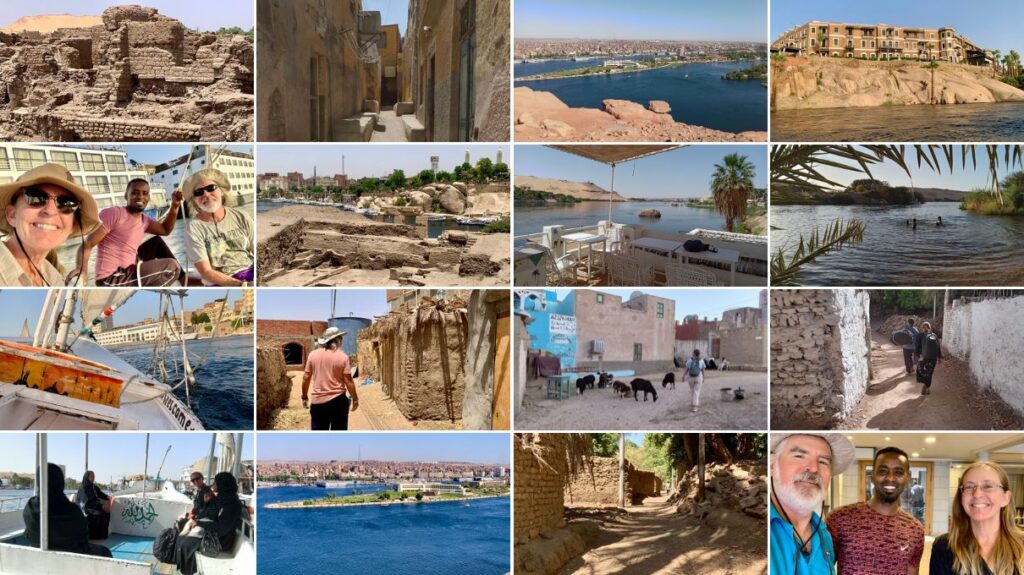On the longest river in the world, there is an island with ancient Egyptian ruins and Nubian people who’ve lived there 7,000 years. The island feels frozen in time. Dusty streets and donkeys. Mango trees and mud brick structures. Yet: satellite dishes and steady electricity.
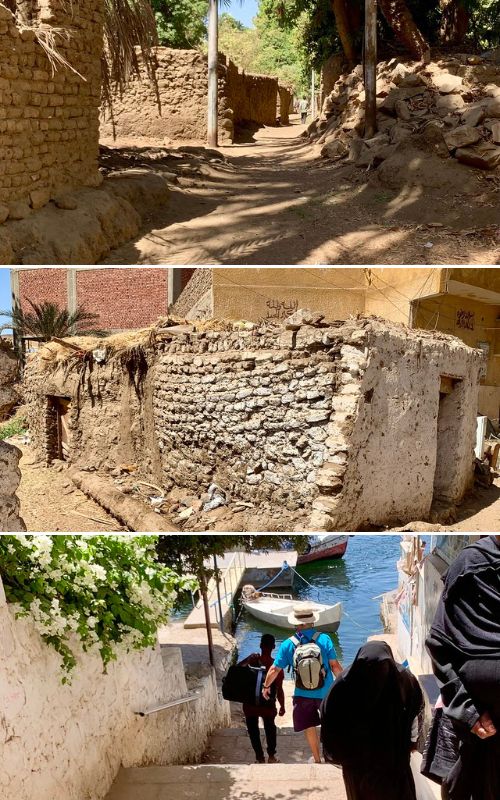
Nearly every one of the locals said “welcome” as they saw us foreigners exploring their village. It might be the only English word many of them know. Arabic is always in the air.
Elephantine Island’s ruins are famous for major clues about ancient Egyptian civilization. But the region’s Nubian people on the island date back before the days of pharoahs and they outlasted that empire, and others that followed.
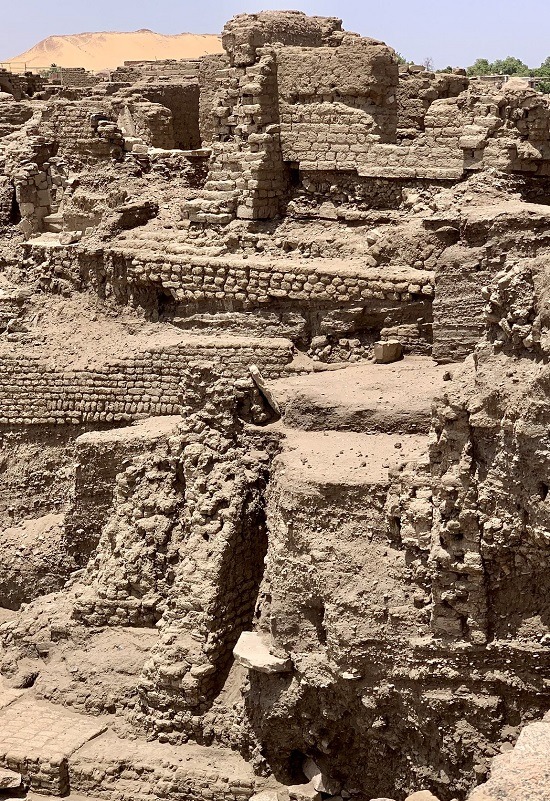
On the south end of Elephantine, Egyptian ruins from three time periods are a joy to explore. There aren’t many tourists at all, yet the site has historic significance. On the north end sits an exclusive luxury Movenpick hotel property, off limits to local people and vagabonds like us. No matter — because it’s in the middle of Elephantine where modern Nubian magic lives. The mundane is magical to observe in the village. Men move building supplies for new homestays and hotels on donkeys. Restaurant owners print menus in near-perfect English. Some restaurants are inside private homes where the matron cooks to order. Felucca sailboats zigzag down and back up the Nile. Young children launch into the Nile from high rocks or docks, screaming and splashing with delight at having beat the heat. Mosques call for prayer five times a day. Round a corner to goats grazing on greens placed onto a dirt road — no roads are paved here in fact, there are no cars and very few motorcycle carts.
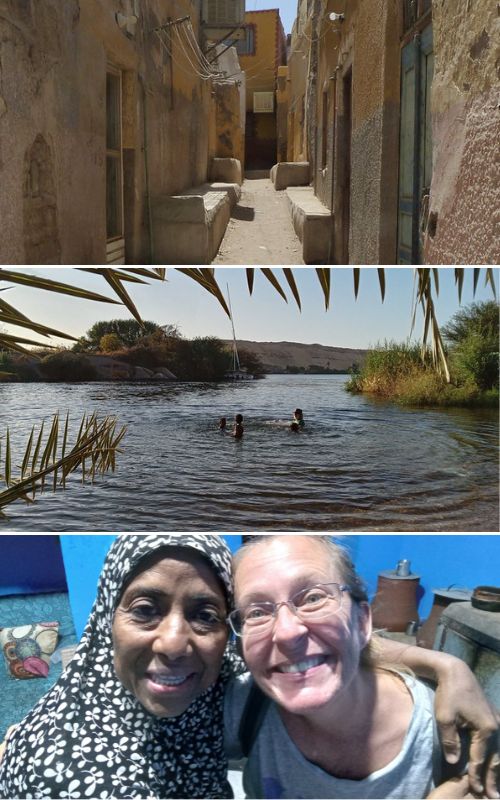
As we observed all of this and more, again and again – and again, people said: “welcome.”
You’ve probably heard of two other massive ruins sites and a famous, pricey hotel in Aswan. The nearby Philae temples and the Abu Simbel temples a 2.5 hour drive south near the border with Sudan are both UNESCO World Heritage sites. Both were temple complexes were moved at great expensive and effort when the High Dam was built to tame the Nile. Interestingly, author Agatha Christie a fan of archaeology and she was smitten with the region. Christie actually looked at Elephantine Island for one year as she wrote Death on the Nile at the Old Cataract Hotel in Aswan. During my stay on the island, I felt I absorbed the same positive energy Christie surely felt as she wrote about human conditions.
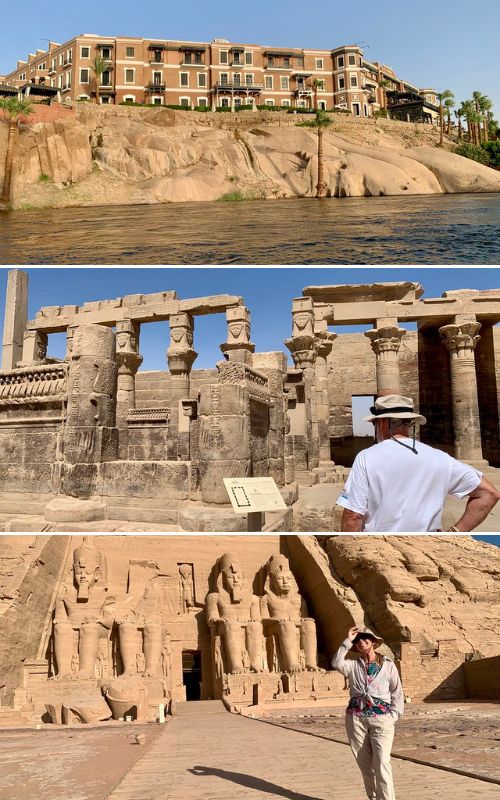
On the island, few touts bugged us for boat or museum tours. But on the Aswan mainland, a short two-minute ferry ride away, touts are aggressive. These are men trying to make a living from tourists. I don’t blame them at all for approaching and asking if we’d like a boat ride on the Nile or a car ride through the desert to Abu Simbel. After all, I came to experience these things. We had no need for these offers, however, because we met a kind young man named Mohammed, who arranged our days to Abu Simbel, Philae, and more. He’s fluent in English, has good connections, and he’s honest.
We stayed at his rental – a well-appointed one bedroom apartment in the middle of the Nubian village on Elephantine Island, a short walk from the ferry, locally-owned convenience stores and eateries, a swimming spot or two, and the island’s famed ruins. He’s listed on Airbnb and booking.com and Google Maps. His unit does not have a view of the Nile, but we didn’t need it. We were out and about each day with a clear view of the river — or nearby Lake Nasser, made of Nile water by the world’s largest earthen damn. He also took us for boat rides, including a felucca, the type of sailboat used on the Nile. All were excellent experiences at good values. But he gave us something money can’t buy: his time. He spent time with us, and he shared about his Nubian heritage, and he answered a million questions about life on Elephantine Island.
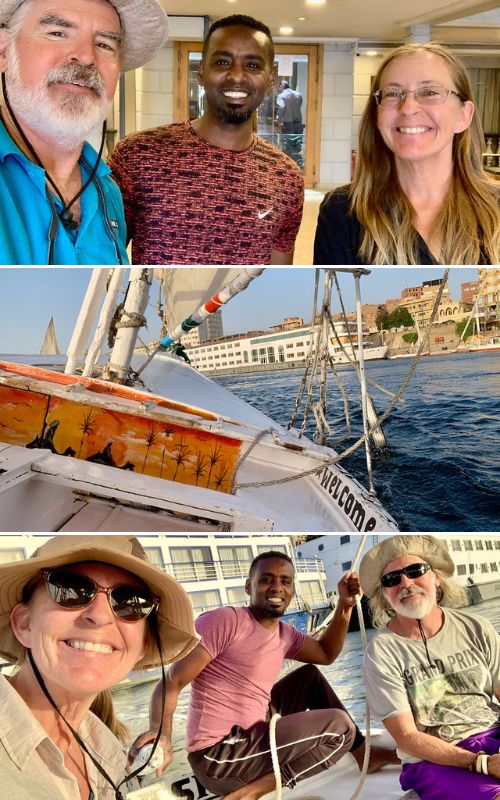
Mohammed met us in Aswan to ride the ferry with us to Elephantine, and carried our heaviest luggage since we couldn’t roll it on the sandy roadway. I followed him onto the ferry – right behind him. He put down our bags, smiled wide, and said ‘ladies sit on that side’. It was one of a few oddities a western woman will experience about Elephantine Island. In the Islamic faith, men and women remain separated in some situations outside homes to lessen temptation. We have traveled extensively in other Muslim countries, but this was a first — and it was no problem.
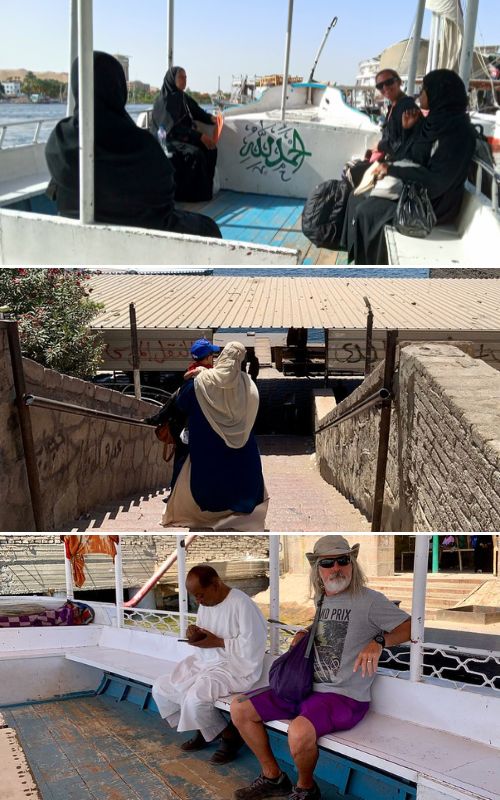
Muslim women dress conservatively in Egypt, and also in Aswan and on Elephantine Island. It seemed more women wore niqabs (face coverings in addition to a hijab, which is a hair and neck covering), and I almost never saw a lady without a hijab, even though about 10% of the Egyptian population is Coptic Christian. The conservative dress is also no problem for me. Not even in the heat – which got up to 109 degrees during our week-long stay. I am a visitor in a foreign land. I’m an observer in an alien place. I want to learn about how other people live and I want to be respectful of other cultures. However, I will confess: sometimes I exited the ferry before the men, or I fell in the line of men as they exited instead of waiting for all of them to leave. They didn’t seem to mind.
Another oddity for me, a Western woman: men avoided looking at me and dealt only with spouse Theo if we were together. It was like I wasn’t even there. One time a tout in Aswan near the ferry to Elephantine came between us to walk next to Theo on a hard sell for a boat tour. A couple of times I was alone, and then a tout approached me on a hard sell effort – but that only happened if Theo wasn’t there.
I’ve read the Quran. I understand how the Prophet Muhammad’s words about women (how they should cover themselves, support their husbands, etc.) translate into modern Islamic lives. Like any religion, some Muslims take a strict interpretive view while others are lax. Like any good traveler, I observe and don’t judge on our differences. Instead, I feel the same, though our paths are different. Faith is personal and it’s between an individual a Higher Power, or the Universal Spirit, or God, or Allah, whatever name you want to use.
But when people around me live by a moral code of kindness and fairness and justness — the foundations of Islam — and when people say “welcome” to me and they really mean it, then that’s a place on Earth I want to visit, and perhaps return.
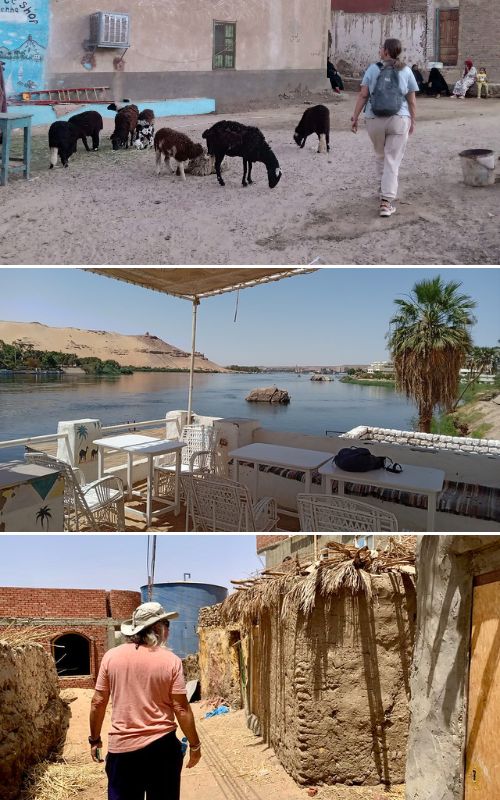
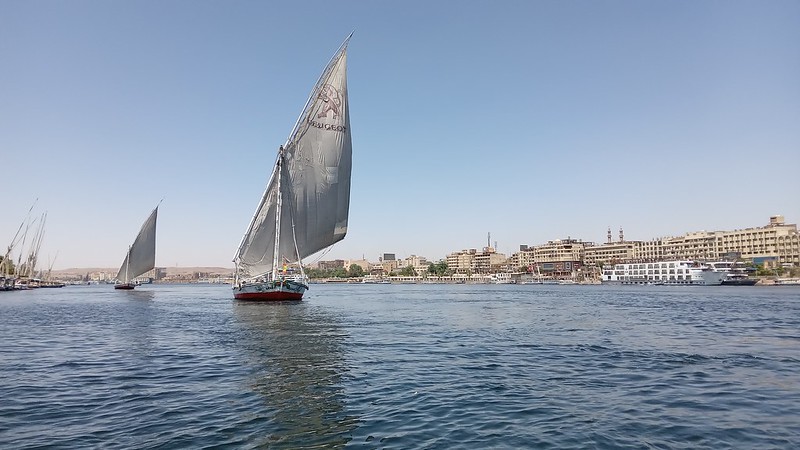
Thanks for reading, “Elephantine Island has 7,000 years of history, a million reasons to visit.”
More posts on Egypt
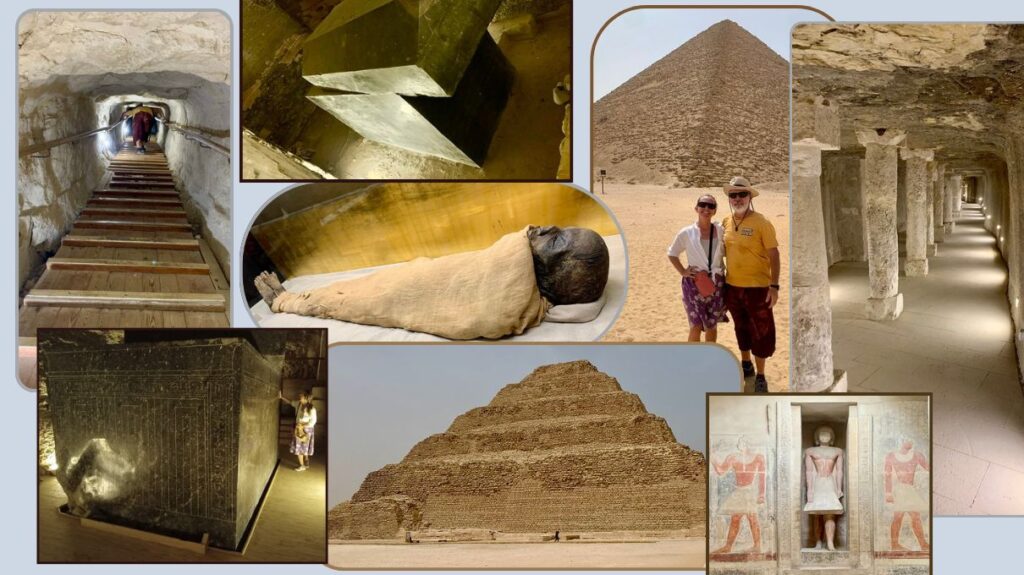
Inside pyramids & tombs at Dahshur & Saqqara, with a stop in Memphis
Ellen
Giza Pyramids shuttle system has 1 big fat flaw (but only 1)
Ellen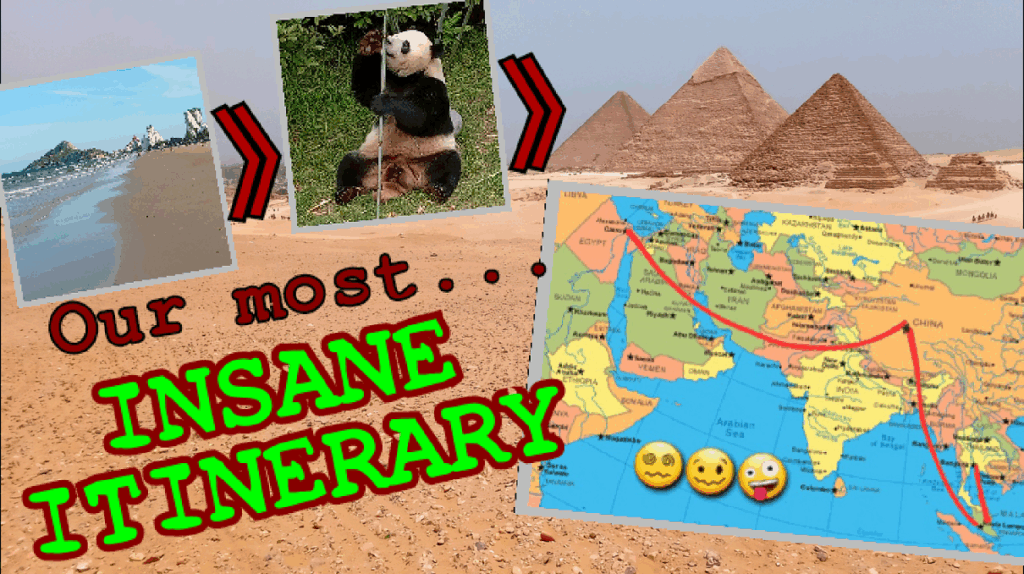
Our most insane itinerary ever
Theo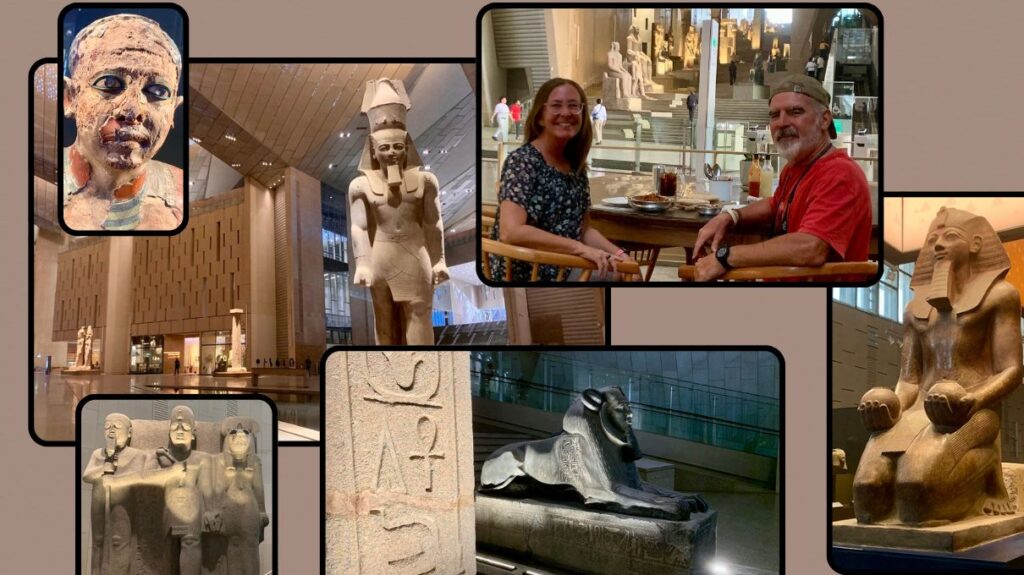
Grand Egyptian Museum: Budget slow travel spot for art history fans
Ellen

